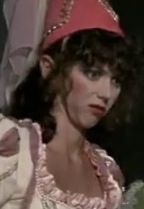Monday, July 4, 1983
PORKY'S II: THE NEXT DAY. Co-written by Roger E. Swaybill and Alan Ormsby. Music by Carl Zittrer. Co-written, co-produced and directed by Bob Clark. Running time: 99 minutes. 14 Years Limited Admittance with the B.C. classifier's warning: not suitable for those under 14; some very coarse language, nudity and suggestive scenes.
IT'S MORNING IN ANGEL Beach, Florida. In his bedroom, Pee Wee Morris (Dan Monahan) is waking up. Suddenly, recalling the full import of what happened the night before, he sits bolt upright.
"I GOT LAID!"
Last night was Porky's, a Canadian-made high-school sex comedy, and one of the top-grossing films of 1982 (with North American rentals in excess of $53 million). More than that, though, Porky's transcended the limitations of teenage sexual-anxiety pictures to become a rite-of-passage tale.
In the process, it demonstrated how good-natured, sweet-tempered and appealing rude humour could be. Given its success, the producers wanted an immediate sequel.
Faced with the demand, writer-director Bob Clark had three choices: refuse, do an unimaginative remake, or attempt to build up and out on the existing characters.
Clark, bless him, made the brave choice. Pee Wee's triumphant shout in the new film's opening scene is the director's announcement that sexual desperation is now past tense.
Porky's II: The Next Day is not about sex, but about maturation in America circa 1954.
This time out the laughter will surround the rather more serious themes of honour, tolerance and honesty. The enemies here are racism, opportunism and hypocrisy, personified by a local fundamentalist preacher, a slick politician and the Ku Klux Klan.
It's the same bunch of guys — actors Wyatt Knight, Roger Wilson, Mark Harrier, Cyril O'Reilly and Tony Ganios return in their roles as Tommy, Mickey, Billy, Tim and Meat — but with an important difference. This time the gang includes a girl: Wendy Williams (Kaki Hunter), the young woman who took Pee Wee's virginity, captured his heart and will help him to grow up in more significant ways in this film.
Clark offers them a challenge that is downright Shakespearean. At issue is the high school drama club's innovative production of Romeo and Juliet, in which white girl Wendy is cast to play opposite Native American John Henry (Joseph Runningfox).
The very idea sends the Reverend Bubba Flavel (Bill Wiley) to his pulpit to fulminate against the outrageous indecency. Flavel's "Righteous Flock" make common cause with the local Klan chapter and pandering county commissioner Gebhardt (Edward Winter) to shut the Shakespeare Festival down.
The bad guys should know better than to mess with friends of the Bard.
In Porky's, Clark showed that he knew the difference between getting it on and getting along. He recognized that sex is one of the funniest things that God ever invented, but only when everybody is in on the joke, and no one is being used.
Porky's II continues in the same mood. The humour is fast paced, appropriately adolescent and funny.
There is, for example, a cemetery scene to compare with the Cherry Forever sequence in the previous picture. There is, as well, a snake that just happens to find its way into the plumbing beneath a toilet bowl favoured by the unpleasant gym teacher, Beulah Balbricker (Nancy Parsons).
If it's not as falling-off-your-seat hilarious as the first film, it probably has more to do with the broader, somewhat meaner world that the gang now inhabits. As Luke Skywalker discovered, growing up means facing up to the dark side of the force.
Inevitably, there will be talk of a Porky's III. Isn't it about time the guys got drafted?
The above is a restored version of a Province review by Michael Walsh originally published in 1983. For additional information on this archived material, please visit my FAQ.
Afterword: Born in New Orleans and raised in Birmingham, Alabama, Benjamin "Bob" Clark is an example of time and place coming together to bring out the best in an artist. Prior to his arrival in Toronto in 1974 to edit his fourth feature film — the Canadian-financed, shot-in-Florida zombie movie Dead of Night (also known as Deathdream) — Clark hardly seemed the sort to make make movie history. During that visit "I fell in love with Toronto and became a landed immigrant," he said in a 2005 interview with the Canuxploitation website. Clark's arrival coincided with the federal government's decision to increase the Capital Cost Allowance (CCA) for investment in domestic film productions from 60 to 100 per cent. Suddenly, movies were a very attractive investment, and Canadian cinema entered its eight-year-long "tax shelter era" (1974-1982).
Clark remained in Canada for the next decade, during which his creativity blossomed. Opportunity came together with inspiration; among the eight features he made here were the game-changing horror film Black Christmas (1974); the now-classic teen comedy Porky's (1982) and the much-loved family feature A Christmas Story (1983). Clark returned to the U.S. in 1984 and, although he made nine more theatrical features, none matched the best of his Canadian pictures for vitality or influence. He died in 2007 in a California car crash. He was 67.
See also: Among Clark's other Canadian features included in the Reeling Back archive are his 1979 Sherlock Holmes thriller Murder by Decree and his adaptation of Bernard Slade's Broadway play Tribute
